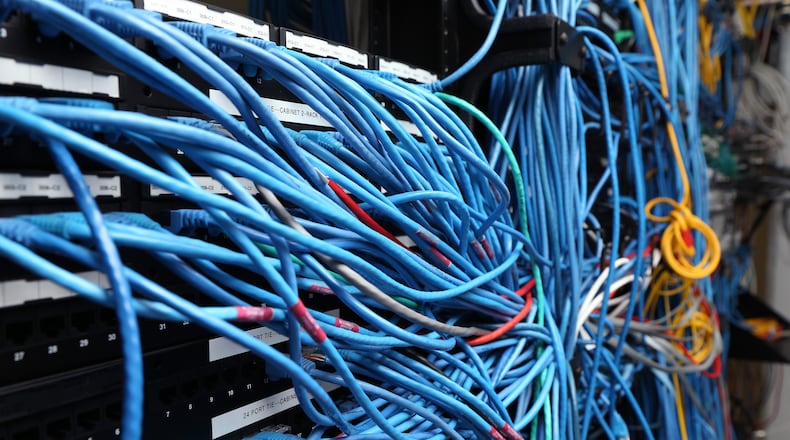Georgia recently finalized a plan to spend the public’s money on subsidies for high-speed internet lines, laying the foundation for broadband expansion in rural areas.
Whether it will work remains to be seen.
Representatives for some internet providers criticized the state’s subsidy rules as being overly burdensome, according to public comments obtained by The Atlanta Journal-Constitution under the Georgia Open Records Act. They also worried that government funding might not go to areas where it’s most needed.
In addition, the government will require internet providers to match state money with their own, a hefty private investment.
Left unsaid in the public comments is that government funding for internet construction doesn't exist yet. State lawmakers will consider appropriating money for subsidies during next year's legislative session.
Internet expansion is a priority among many of Georgia's elected leaders who see it as a critical need for rural communities with dwindling populations and business opportunities. Hundreds of thousands of households can't buy high-speed internet service in their areas, according to state estimates.
It would likely cost more than $3 billion in public and private investment to wire areas without high-speed internet across the state. Legislators have yet to decide how much to spend or where the money would come from.
The OneGeorgia Authority, a rural development fund that hands out millions of dollars annually, approved the broadband subsidy rules June 17 after reviewing public comments submitted by internet providers, trade associations and local governments.
A key objection to the internet subsidy rules was that they call for a convoluted method of distributing government funds in order to avoid running afoul of the Georgia Constitution's ban on direct public funding of private companies. Instead, internet companies will have to apply for money through quasi-governmental economic development boards in the same way other tax incentives are awarded to businesses.
That requirement “could potentially add some unnecessary complexities” for internet companies seeking subsidies, said Cheryl McCollum, a spokeswoman for TDS Telecom, which serves areas including Ball Ground, Blue Ridge, Camden and St. Marys.
Other states with internet grant programs don’t require companies to work through local development boards, a concern repeated by the Georgia Telecommunications Association, which represents 29 independent phone companies.
The state’s broadband director, Deana Perry, said that while some companies might see Georgia’s subsidy rules as a barrier, many will welcome the opportunity to receive government funding.
“There’s a large number of providers in the state that are well-equipped and well-positioned to take advantage of funding through this program,” Perry said. “This will be a multiresource effort, and of course, it will also require private investment. That’s really what all these programs are designed to do: incentivize private investment.”
The Georgia Telecommunications Association said the requirement for companies to put up so much of their own money will prevent subsidies from reaching communities that lack internet access.
“Rural areas that do not currently have broadband most likely haven’t built out the infrastructure due to financial limitations. And requiring a 50% contribution match would continue to leave areas that couldn’t produce the match without broadband service,” according to the association’s written comments.
The River Valley Regional Commission, which promotes the economies of 35 local governments in southwest Georgia, said smaller companies in more rural communities might be left out.
“The structure here will … spur investments and speed investments where they are going to happen anyway,” according to the unsigned written comment from the commission. “Protections to areas with momentum (growth corridors) will be at the expense, with limited dollars, of communities that are in decline or at risk of decline.”
Projects will be approved based on a competitive bidding process that accounts for the number of locations, economic impact and cost per location. Subsidies would fund residential and commercial internet lines in areas that lack access to internet download speeds of at least 25 megabits per second.
Subsidies for each approved internet construction project will be worth between $250,000 and $2 million. Internet providers will have to invest an equal amount of their own money.
Along with the subsidies, the state government is creating a detailed map of every location in the state without high-speed internet. Only areas that lack adequate internet service would be eligible for government funding.
House Rules Chairman Jay Powell said government funding is needed because internet service is essential to businesses, schools and hospitals. Without subsidies, internet companies often can't justify spending money to build internet lines in rural areas with a small numbers of potential customers.
Just as the government invested in electricity, phone and water services, it now must prioritize internet, said Powell, a Republican from Camilla.
“The information highway is no less of a highway than the other highways we’re building throughout Georgia to facilitate rural development,” Powell said. “Internet is as much a necessity in rural Georgia now as all those other services were 100 years ago.”
Stay on top of what’s happening in Georgia government and politics at www.ajc.com/politics.
About the Author
Keep Reading
The Latest
Featured




